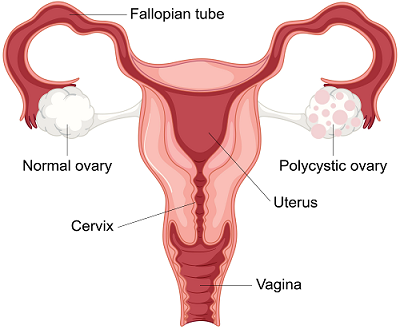Polycystic Ovarian Syndrome, commonly known as PCOS, is a hormonal disorder that affects a significant percentage of women in their childbearing years, ranging from about 2 to 27 percent. Surprisingly, approximately 70 percent of women with PCOS are unaware of their condition.
Women with PCOS experience an abnormal increase in male hormones, leading to irregular menstrual cycles and, in many cases, infertility. Additionally, excessive hair growth on the body and face may be noticed. If left untreated, PCOS can contribute to long-term health complications such as heart disease and diabetes.
Causes of PCOS
Normally, a woman's ovaries release an egg each month, facilitated by follicle-stimulating hormone (FSH) and luteinizing hormone (LH). These hormones stimulate the ovaries to produce a mature follicle containing the egg, which is then released through ovulation.
In the case of PCOS, hormonal imbalances disrupt this process. Ovulation becomes irregular or may not occur at all. PCOS is characterized by elevated levels of male hormones, the presence of fluid-filled cysts within the ovaries (follicles that do not mature sufficiently for release during ovulation), and irregular or absent menstrual periods.
As a result of the ovulation disturbances, hormone levels such as estrogen, FSH, LH, and progesterone are affected. Female hormone levels tend to be lower than normal, while male hormones or androgens are usually higher.
While the exact causes of PCOS are still being studied, it is believed that factors such as genetic predisposition, insulin resistance leading to increased male hormone production, and inflammation play a role. Weight management can also be challenging for women with PCOS.
Symptoms of PCOS
PCOS symptoms can manifest as early as a woman's first period or may become evident later, especially with weight gain or difficulties in achieving pregnancy. Common symptoms include irregular or absent periods, heavy menstrual bleeding, abnormal hair growth on the body and face, weight gain, acne, male-pattern baldness, headaches, and dark patches on the skin.
The association between PCOS and elevated androgen levels often leads to infertility due to irregular ovulation. In fact, PCOS is one of the leading causes of infertility in women. Moreover, approximately 80% of women with PCOS are overweight or obese, increasing their risk of metabolic syndrome characterized by high blood sugar levels, high blood pressure, high "bad" cholesterol, and low "good" cholesterol. PCOS also raises the risk of sleep apnea, endometrial cancer, depression, and other conditions.
Treatment for PCOS: Treatment for PCOS is tailored to an individual's specific symptoms and goals. The primary goals of treatment include:
-
Regulating Menstrual Cycles: Oral contraceptives (birth control pills) are often prescribed to regulate menstruation and reduce androgen levels.
-
Fertility Treatment: Women trying to conceive may require ovulation-inducing medications like Clomiphene or gonadotropins. In some cases, in vitro fertilization (IVF) may be recommended.
-
Managing Hyperandrogenism: To address hirsutism and acne, anti-androgen medications like spironolactone or certain oral contraceptives may be used.
-
Lifestyle Modifications: Lifestyle changes such as weight loss, regular exercise, and a balanced diet can help improve insulin sensitivity and reduce metabolic risks associated with PCOS.
-
Medications for Insulin Resistance: In cases of insulin resistance or prediabetes, medications like metformin may be prescribed to help control blood sugar levels.
-
Surgery: In rare cases where medications and lifestyle changes are ineffective, surgical interventions like ovarian drilling or bariatric surgery may be considered.
If you suspect you may have PCOS, it is crucial to consult your doctor, particularly if you are experiencing missed periods (while not pregnant) or any of the aforementioned symptoms. Early diagnosis and appropriate treatment can help manage PCOS effectively and improve overall health and well-being.

